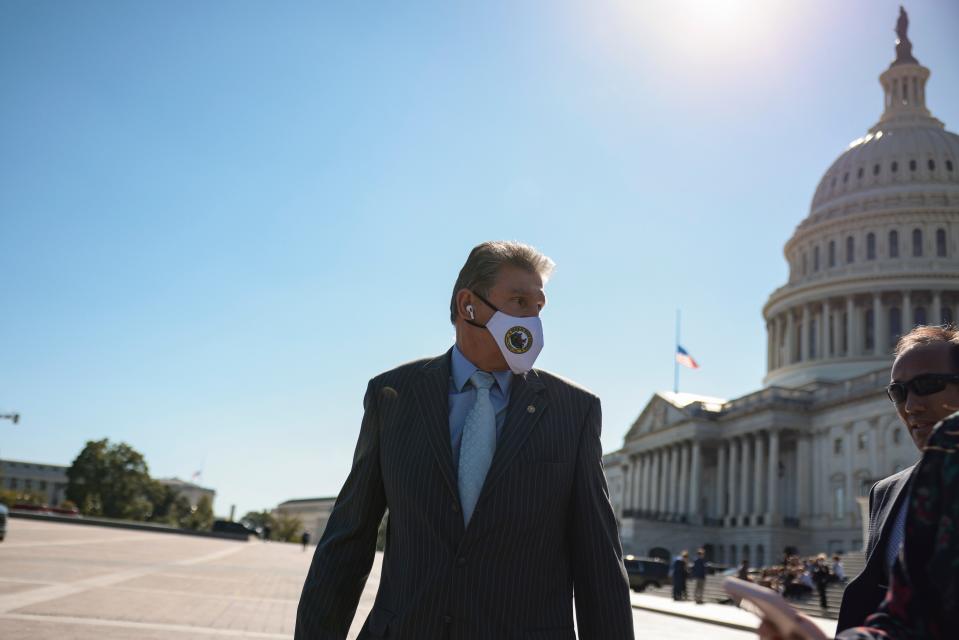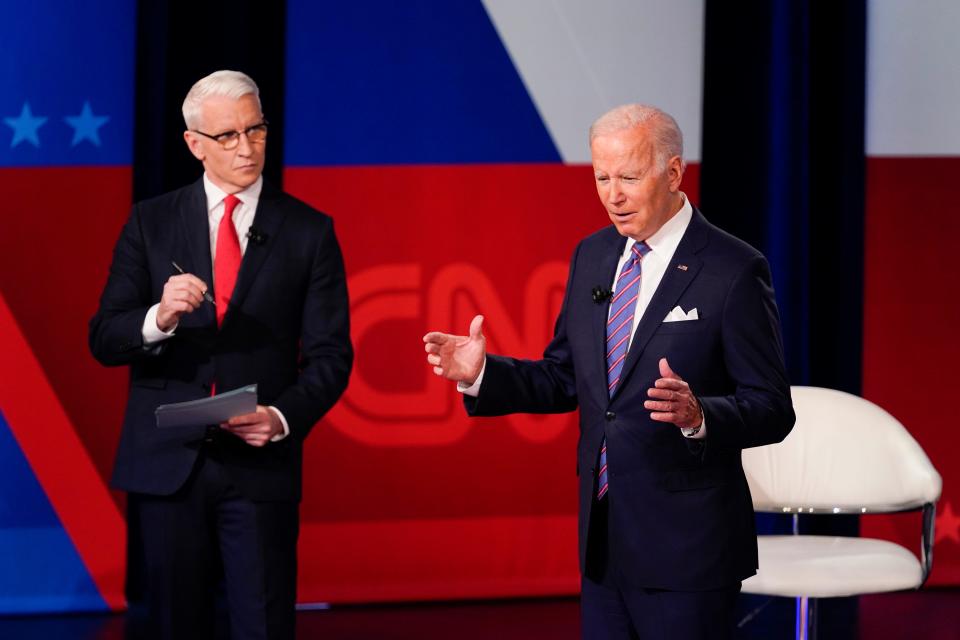Child care, climate change and $1.2 trillion worth of other initiatives face a Halloween deadline. Here's where we are.
WASHINGTON – Democratic lawmakers on Capitol Hill are scrambling to make a Sunday deadline to complete two big parts of President Joe Biden's economic agenda.
House Speaker Nancy Pelosi, D-Calif., earlier this month, set a new deadline of Oct. 31 for the House to pass a $1.2 trillion bipartisan infrastructure bill and achieve consensus on a bigger budget bill that includes a number of liberal policies like subsidizing child care and fighting climate change. .
The progressive and moderate wings of the Democratic Party have for months struggled to come to an agreement on how to move forward with the measures, which if passed, would mark a major victory for Biden ahead of a crucial Virginia governor's race next week and the 2022 midterm elections.
OnPolitics: Democrats are getting closer to a social spending bill
Biden met with Senate Majority Leader Chuck Schumer, D-N.Y., and Sen. Joe Manchin, D-W.V., in Delaware over the weekend to finalize agreements on the package. Manchin, a moderate from a Republican-leaning state, has demanded the size of the bill be reduced. The White House called the meeting a "productive discussion."
Biden told reporters he wants a deal by the time he leaves the country for Europe on Thursday, saying it would be "very positive to get it done" before his trip.
Now, with the self-imposed deadline just days away, Democrats in both chambers are again rushing to pull both sides of the party together to pass the sweeping agenda.
More: Barack Obama stumps for Terry McAuliffe as tight Va. governor's race worries Democrats
Here's what we know about the negotiations:
What do Democrats want done by Halloween?
Biden and Democrats want to reach an agreement on framework for the reconciliation package, and for the House to vote on the bipartisan infrastructure bill, so Biden can sign that into law by the time the 30-day reauthorization of the federal highway programs expires on Oct. 31
On CNN's "State of the Union" on Sunday, Pelosi said "that's the plan" when asked about finalizing the agreement on the budget bill and also voting for the bipartisan infrastructure bill.
Pelosi was prepared to have the House vote last month on the bipartisan infrastructure legislation, which funds roadways, bridges, public transportation and expanded broadband internet, after it passed the Senate 69-30 in August. But progressives in her caucus forced her to delay that vote, arguing they should not vote on the infrastructure deal without passage of the separate budget bill.
A month later, there is still no agreement on the budget bill, meaning the infrastructure bill is also being held up.
More: Here's what's in the infrastructure bill as it nears a vote in the House

Two Democratic senators, Manchin and Krysten Sinema of Arizona, have said the original $3.5 trillion price tag of the budget proposal was too high and have pushed for the size of the bill to come down.
Negotiations between the White House, progressives, and Manchin and Sinema have been happening for weeks as all sides try to find consensus on a slew of issues and how they are going to scale the package back.
More: Why is there so much drama over the infrastructure vote in the House?
How big does Biden, Manchin want the budget bill to be?
Biden's original budget included $3.5 trillion for progressive priorities like free community college and expanded Medicare.
'These issues are hard': Coal country's centrist senator may hold up Biden's climate change agenda
Last week, Biden said during a CNN town hall that the scaled-down budget package would land around $2 trillion. Manchin has publicly maintained he doesn't want to go over $1.5 trillion.
Rep. Pramilla Jayapal, D-Wash., chair of the House Progressive Caucus, said last week after a meeting with the White House that Biden wants to stick to a number between $1.9 trillion and $2.2 trillion.
But on Monday, Biden touted $1.75 trillion as a possible number for the bill. CNN reported Manchin told leaders he could be open to that amount during negotiations.
"By the way, you hear these numbers, $3.5 trillion or $1.75 trillion? We pay for it all. It doesn't increase the deficit one single cent," Biden said.
How might the bill be trimmed?
Sinema and Manchin have not only taken issue with the price, but have also targeted other aspects of the bill, including some of the climate initiatives and tax increases within the legislation.
"She will not raise a single penny on the corporate side or on wealthy people. Period," Biden said of Sinema during the town hall, referring to his plan to raise taxes on corporations and high-income earners to pay for his proposed spending.
Biden said Sinema told him she was opposed to raising the corporate tax rate above 21%, the level locked in with former President Donald Trump's 2017 tax cuts.

Biden also called it a "reach" to secure funding for Medicare expansion to cover hearing, dental and vision benefits – a top priority of many liberals. "Here's the thing: Mr. Manchin is opposed to that. And I think Mrs. Sinema is as well."
Sen. Bernie Sanders, I-Vt., a progressive involved in negotiations, tweeted Saturday that the expansion of those benefits “is one of the most popular and important provisions" in the bill.
“It’s what the American people want. It’s not coming out,” he added.
The expansion of Medicare to cover dental, hearing and vision is one of the most popular and important provisions in the entire reconciliation bill. It’s what the American people want. It’s not coming out.
— Bernie Sanders (@SenSanders) October 24, 2021
But Manchin told reporters Monday that he is worried that expanding Medicare is not “fiscally responsible” since it may potentially be insolvent by 2026.
Biden also said during the town hall that tuition-free community college, which carries a cost of $109 billion, would likely be cut out of the bill. He said his $225 billion plan to provide three months of paid family and medical leave would be cut down to four weeks from the 12 weeks proposed.
Several climate initiatives may also be in danger.
Manchin opposes efforts to quickly phase out fossil fuels and has already come out against a part of the bill that would reward utilities that speed up their transition to clean energy – and penalize them if they don't.
What's next?
The negotiations are ongoing and the details are being finalized. But leaders over the weekend emphasized they can see the light at the end of the tunnel.
“We have 90% of the bill agreed to and written, we just have some of the last decisions to be made,” Pelosi said Sunday.
She said a vote on the budget package may not happen before Biden leaves for Europe, or before their Oct. 31 deadline, but next steps may be for Democrats to finalize an "agreement" on the reconciliation framework.
If an agreement is reached, and approved by caucuses in both chambers, they may then have a vote on the bipartisan infrastructure bill in the House this week. The bipartisan legislation would then go to Biden for his signature.

Pelosi stressed Congress needs to pass the bipartisan infrastructure deal when the 30-day reauthorization of federal highway programs expires at the end of the month, saying "We have to get billions of dollars someplace to continue that."
If they aren't able to vote on the bipartisan infrastructure bill, Congress would need to pass another extension of highway legislation while negotiations continue.
Manchin on Monday told reporters that a deal on a framework could be completed this week, while Schumer said "there are 3-4 outstanding issues."
"We first have to get some kind of agreement on those and then move forward from there," he continued. "A lot of the bill is written, as you know.”
Progressives insisted last month that a vote on the budget bill happen before the vote on the bipartisan infrastructure deal. However, progressive Rep. Ro Khanna, D-Calif., said on Fox News Sunday "if the president gives his words and has a clear commitment, that will be good enough."
"My view is that the President's word saying, 'I have the commitment of 50 senators and those 50 senators are going to vote for this bill, and here are the details,' that that's good enough."
Contributing: Joey Garrison, Ledge King, Courtney Subramanian
This article originally appeared on USA TODAY: Biden's agenda reaches critical juncture for Medicare, reconciliation

 Yahoo Movies
Yahoo Movies 
